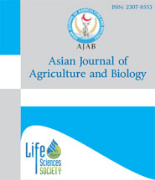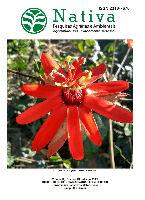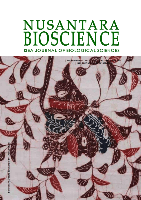
Bioscience Journal
Scope & Guideline
Empowering discovery through open-access bioscience research.
Introduction
Aims and Scopes
- Agricultural Biotechnology:
The journal publishes studies on genetic engineering, plant breeding, and the use of biotechnological methods to improve crop yields and resistance to pests and diseases. - Microbiology and Pathogen Studies:
Research on microorganisms, including their roles in health and disease, environmental impact, and biotechnological applications, is a significant focus area. - Ecological and Environmental Research:
The journal emphasizes studies that explore ecological dynamics, biodiversity, and the effects of human activity on natural systems. - Health and Clinical Research:
Papers examining health issues, clinical trials, and the efficacy of treatments, particularly in relation to infectious diseases and public health, are prevalent. - Plant Science and Agronomy:
Research on plant physiology, crop management practices, and the impact of environmental factors on plant growth and productivity is a core area of interest. - Nutritional and Food Sciences:
Studies investigating the nutritional aspects of food sources, their health benefits, and the impact of food processing are included.
Trending and Emerging
- Sustainable Agriculture and Food Security:
There is an increasing emphasis on research aimed at sustainable agricultural practices that enhance food security, particularly in the context of climate change. - Microbial Resistance and Infectious Diseases:
Research on antimicrobial resistance and the search for new treatments against resistant pathogens is trending, reflecting global health concerns. - Climate Change Impact Studies:
Emerging studies focus on the effects of climate change on biodiversity, agriculture, and health, showcasing a growing interest in the interconnectivity of these fields. - Functional Foods and Nutraceuticals:
The exploration of foods that provide health benefits beyond basic nutrition is gaining popularity, with research focusing on bioactive compounds and their effects on health. - Bioremediation and Environmental Restoration:
Research on the use of biological methods to restore contaminated environments is on the rise, highlighting the journal's commitment to addressing ecological challenges.
Declining or Waning
- Traditional Medicinal Plants:
Research on the pharmacological properties of traditional medicinal plants has seen a decline, likely due to a shift towards more empirical and clinical studies. - Invasive Species Management:
The frequency of studies dedicated to invasive species management has decreased, possibly as researchers pivot to broader ecological impacts rather than specific species. - Soil Chemistry and Fertility Studies:
While still relevant, detailed analyses focused solely on soil chemistry without integrating broader ecological or agricultural contexts are becoming less common. - Basic Entomology:
Research that focuses narrowly on entomological taxonomy or basic behavior studies without application to agriculture or ecology is waning. - Conventional Agricultural Practices:
Papers advocating for traditional agricultural practices are diminishing, as the focus shifts towards sustainable and innovative agricultural technologies.
Similar Journals

CABI Agriculture & Bioscience
Elevating agricultural research to new heights.CABI Agriculture & Bioscience is an esteemed international journal published by SpringerNature, dedicated to advancing the fields of Agricultural and Biological Sciences, Animal Science, and Horticulture. With a strong focus on promoting Open Access research since 2020, this journal aims to disseminate scientific knowledge and innovative findings that contribute to sustainable agricultural practices and bioscience advancements. Situated in the United Kingdom, it has rapidly established itself as a premier platform, achieving impressive Q1 rankings in multiple categories, including Agricultural and Biological Sciences and Horticulture, as well as being among the top tier in Food Science. Its exceptional standing—reflected in its Scopus rankings, where it ranks in the 88th and 86th percentiles in key fields—underscores its importance to researchers, professionals, and students alike, fostering an environment for impactful collaboration and growth in the biosciences. By offering Open Access options, CABI Agriculture & Bioscience ensures that vital research is available to a broad audience, facilitating increased visibility and engagement within the global scientific community.

Zemdirbyste-Agriculture
Harvesting insights for a resilient agricultural landscape.Zemdirbyste-Agriculture is a prominent journal dedicated to advancing the field of agricultural sciences, with a particular focus on agronomy and crop science. Published by the Lithuanian Research Centre Agriculture & Forestry, this open access journal has been fostering knowledge sharing and scientific discourse since 2004, allowing researchers, professionals, and students unrestricted access to its content. Located in the beautiful country of Lithuania, specifically at Vytautas Magnus University, this journal plays a significant role in disseminating innovative research findings. With a 2023 Scopus ranking of #246 out of 406 in the category of Agricultural and Biological Sciences, Zemdirbyste-Agriculture falls within the Q3 quartile, reflecting its growing influence in the academic community. This journal, which has converged its publication focus from 2008 to 2023, aims to provide a platform for scientists to share their critical insights on agricultural practices, sustainability, and technological advancements in crop science, thereby contributing to the global discourse on food security and environmental health.

Asian Journal of Agriculture and Biology
Showcasing groundbreaking research for global agricultural and biological progress.Welcome to the Asian Journal of Agriculture and Biology, a premier open access journal published by LIFE SCIENCES SOC PAKISTAN, dedicated to advancing research in the fields of agricultural and biological sciences. Since its inception in 2013, this journal has provided a vital platform for scholars and practitioners to disseminate novel findings and innovative methodologies that contribute to the betterment of agricultural practices and biological research. With an impressive H-Index and ranked in the Q3 category across multiple disciplines including Agricultural and Biological Sciences, Biochemistry, Genetics, and Molecular Biology, as well as Medicine, the journal showcases high-quality research that influences both academic and practical applications globally. The journal is indexed in Scopus, reinforcing its commitment to high academic standards and providing researchers with efficient access to significant knowledge. Based in Pakistan, the Asian Journal of Agriculture and Biology is your gateway to staying abreast of the latest trends and discoveries that support sustainable development and health sciences.

Vestnik Tomskogo Gosudarstvennogo Universiteta-Biologiya
Fostering Global Research in Agricultural and Environmental SciencesVestnik Tomskogo Gosudarstvennogo Universiteta-Biologiya is a prominent peer-reviewed journal dedicated to advancing knowledge in the fields of Agricultural and Biological Sciences, Biochemistry, and Environmental Science, published by TOMSKIJ GOSUDARSTVENNYI UNIV in the Russian Federation. With an ISSN of 1998-8591 and an E-ISSN of 2311-2077, this journal serves as a vital platform for researchers to disseminate findings that encompass diverse biological disciplines. Although currently categorized in the fourth quartile across several fields, including Agricultural and Biological Sciences (Q4) and Environmental Science (Q4), the journal is committed to improving its academic impact and visibility. Its publication spectrum includes significant contributions from both local and international scholars, fostering a rich exchange of ideas and research methodologies. Access to the journal’s content is unrestricted, providing valuable resources for students, professionals, and researchers alike. As the journal converges its focus from 2018 to 2024, it aims to enhance its academic stature while contributing rigorously to contemporary biological research.

PAKISTAN JOURNAL OF AGRICULTURAL SCIENCES
Fostering Sustainable Solutions in Agricultural SciencesWelcome to the Pakistan Journal of Agricultural Sciences, a prominent platform for disseminating vital research findings in the fields of agronomy, crop science, food science, plant science, and soil science. Published by the prestigious University of Agriculture in Faisalabad, this journal aims to enhance the scientific discourse surrounding agricultural innovation and sustainability in Pakistan and beyond. With an ISSN of 0552-9034 and E-ISSN of 2076-0906, the journal serves as a valuable resource for researchers, professionals, and students interested in cutting-edge agricultural developments. As of 2023, the journal is ranked in the Q3 category for Agronomy and Crop Science as well as Food Science and positioned in Q4 for Plant and Soil Science, highlighting its growing impact within a competitive academic landscape. While the Pakistan Journal of Agricultural Sciences is not currently open access, it provides a comprehensive archive of research converging from 2011 to 2024, ensuring that critical knowledge remains accessible to those striving to advance the agricultural sciences. Join us in our mission to foster innovation and support sustainable practices in agriculture.

Nativa
Empowering global research for a greener future.Nativa, published by the Universidade Federal de Mato Grosso in Brazil, stands as a prominent open-access journal since 2013, dedicated to the dissemination of research across various domains of Agricultural and Biological Sciences. With its ISSN 2318-7670, Nativa aims to foster scholarly communication and collaboration among researchers and practitioners worldwide. The journal occupies notable positions within the Scopus rankings, with a Q3 classification in several categories, including Agricultural and Biological Sciences (miscellaneous) and Environmental Science (miscellaneous), while also holding a Q4 classification in areas such as Agronomy and Crop Science and Animal Science and Zoology. This positioning reflects its commitment to advancing knowledge and understanding crucial to sustaining and enhancing our natural resources. Nativa seeks to engage a diverse readership by providing a platform for innovative research, fostering interdisciplinary discourse, and addressing pressing environmental challenges and conservation efforts essential for sustainable development.

Revista Fitotecnia Mexicana
Nurturing Research for the Next Generation of AgricultureRevista Fitotecnia Mexicana is a prominent academic journal published by the SOC MEXICANA FITOGENETICA, dedicated to advancing knowledge in the fields of agronomy, crop science, genetics, horticulture, and plant science. With its establishment dating back to 2007 and currently running through 2024, this journal serves as an important platform for researchers, professionals, and academic institutions interested in plant genetic resources and agricultural innovations. Although it holds a Q4 quartile ranking in various categories and is positioned within the lower percentiles in Scopus rankings, it provides crucial insights and opportunities for emerging ideas and local research initiatives. Based in Mexico, and with its indexed ISSN 0187-7380, the journal plays an important role in stemming from the rich agricultural heritage of the region. The lack of open access options underscores the depth of curated content provided, making it a valuable resource for professionals seeking to expand their expertise in the sector.

Nusantara Bioscience
Advancing the Frontiers of Bioscience KnowledgeNusantara Bioscience is a prominent open-access journal dedicated to the field of biosciences, published by the Masters Program in Public Health at UNIV SEBELAS MARET in Surakarta, Indonesia. Since its inception in 2009, this journal has made significant contributions to the global discourse on biological sciences, environmental health, and public health research, providing researchers and professionals with an essential platform for sharing their findings. The journal, which holds an ISSN of 2087-3948 and an E-ISSN of 2087-3956, is committed to maintaining high academic standards while ensuring accessibility to quality research outcomes. Nusantara Bioscience enables a diverse audience, from students to seasoned researchers, to disseminate impactful studies and advance knowledge in the biosciences, reflecting the evolving challenges and innovations within the field.

Chemical and Biological Technologies in Agriculture
Pioneering Research for Sustainable AgricultureChemical and Biological Technologies in Agriculture is a premier open-access journal published by SPRINGER, dedicated to advancing research in the fields of agronomy, crop science, biochemistry, biotechnology, and food science. Established in 2014, this journal has quickly gained recognition, boasting impressive rankings with Q1 status in Agronomy, Crop Science, Biotechnology, and Food Science categories as of 2023, underscoring its significance in fueling innovations in agricultural technology. With an E-ISSN of 2196-5641, it provides a platform for researchers and practitioners to disseminate impactful findings and methodologies that address key challenges in sustainable agricultural practices. By facilitating open access to contemporary research, the journal aims to foster collaboration and knowledge exchange among multidisciplinary stakeholders in the agricultural sector. With a commitment to excellence reflected in its Scopus rankings, notably #57 in Agronomy and Crop Science, it serves as an invaluable resource for professionals, researchers, and students striving for breakthroughs in chemical and biological technologies. The journal remains at the forefront of addressing global food security and environmental sustainability through rigorous scientific inquiry.

Journal of Agricultural Sciences-Tarim Bilimleri Dergisi
Exploring New Frontiers in Agronomy and Crop ScienceJournal of Agricultural Sciences - Tarim Bilimleri Dergisi, published by Ankara University, Faculty of Agriculture, is a prominent open-access journal that has been fostering academic dialogue in the field of agricultural studies since 2010. With ISSN 1300-7580 and E-ISSN 2148-9297, this journal contributes significantly to the scientific community, particularly within the realms of agronomy, crop science, animal science, and plant science. As of 2023, it holds a Q3 classification in Agronomy and Crop Science, and Q4 in both Animal Science and Zoology and Plant Science, indicating its growing influence and dedication to advancing research in these areas. Situated in Turkey, this journal serves as a vital platform for scholars, professionals, and students, inviting submissions that enhance our understanding of agricultural innovation and sustainability. With a commitment to disseminating high-quality research, Journal of Agricultural Sciences ranks favorably within Scopus, providing an invaluable resource for exploring evolving agricultural paradigms.